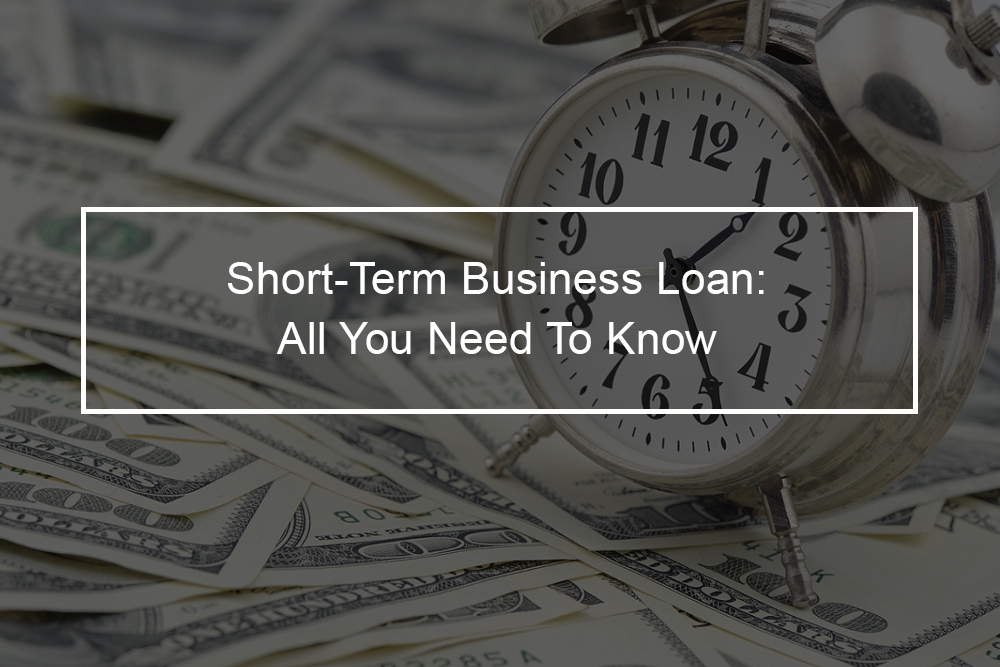Despite how hard you try to plan ahead, unexpected business expenses can happen to anyone. A piece of business equipment that is crucial to your operations might break. Also, you might suddenly require more inventory to fulfill a large order that came in unexpectedly. Perhaps you need a little extra working capital to pay your staff while you wait for clients to pay their invoices. In such an event, you will need some extra money, and you need it immediately. It is times like these when many business owners turn to short-term business loans.
What is a short term business loan?
A short-term business loan is a form of loan that is intended to be paid off much faster than a regular business loan. Whereas traditional business loans can take several decades or years to pay off, short-term business loans are frequently paid off in a matter of months, even though some can last for up to three years. Exact repayment terms usually vary; however, most short-term business loans last for one year or less. Some common kinds of short-term business loans incorporate invoice financing and merchant cash advances.
When should my business consider short-term business loans?
The first question any company should ask before it borrows money is, ‘what is the purpose of the loan’ This will help determine how much money they need to borrow, the term of the loan that makes sense, and where they might look to secure the financing.
Based on the loan purpose, some small business borrowers chose a shorter-term loan to reduce the loan’s total dollar. Following a survey commissioned by the Electronic Transactions Association, fifty-seven percent of small businesses would select a shorter-term loan to reduce the expenses and total fees when presented with a short-term investment opportunity.
Since APR does not represent the total dollar cost of a loan, this was true provided the shorter-term loan incorporated a higher APR than the longer-term option. The two main identified loan purposes of the small businesses participating in the survey were to buy equipment (54% or to buy inventory (51%)- both purchases tend to be very dollar total sensitive. What is more, those small businesses were expecting a five times return for every dollar they were loaned, making the total dollar cost of the loan a pivotal consideration to them.
Some common reasons for considering a short-term business loan
Bridging a seasonal cash flow gap
Most seasonal businesses sometimes borrow money to meet short-lived cash flow stipulations during lulls that exist between their busy periods to cover expenses during the downtime. Doing so needs the business to ensure that it has sufficient cash flow during that slow period to ensure the larger periodic payments often linked to a short-term loan.
Project start-up costs
There are periods when ramping up a new project requires upfront costs that may exceed a business; however, it will be recouped in sixty or ninety days since their customer (s) pay their invoices. In that situation, the ability to get in and out of the funding faster at a lower total dollar cost could be sensible than making payments on a longer-term loan for several years.
Cover the costs of emergency repairs of vital equipment
When equipment necessary to your business’s operation fails, a short-term small business loan can assist you in getting operations moving again without a four-year or longer loan obligation.
Buying quick-turnaround inventory at a discount
A short-term business loan can be a good opportunity for purchasing inventory at a discount that will turn faster and enable the business to capture more profits. And, most times, short-term business loans might come with faster approval rates than more traditional long-term funding at the bank- which assists when time is of the essence.
Benefits and drawbacks of short-term business loans
Benefits of short-term business loans
Short business loans advantages
- Easier and faster to apply for than regular business loans: Applying for a business loan via a bank engages filling out lots of paperwork and waiting for weeks or months to be approved and get the money. When business owners are experiencing a sudden, unexpected expense, applying for a traditional business loan simply might not be a viable option. Lenders generally have more relaxed requirements for short-term business loans, making it easier for businesses that do not meet the regular business loan standards to receive funding.
- Short-term loans are also an alternative for business owners who need to borrow a comparatively small amount of money: In most situations, business owners are rejected for traditional business loans since they are not seeking loans large enough to generate enough of a profit for the lender.
- Some companies use short-term loans specifically since they are short-term in nature: Because many business owners only require funding to get over temporary financial hurdles, they do not like the idea of being stuck clearing a loan years after the original need for that financing has passed.
- Moreover, small short-term business loans can be used to increase your business credit score: As you make progress on clearing a short-term loan, your regular payments will be reflected on your credit score. With a good credit score, you will have an easier time qualifying for larger business loans with better terms later on if required.
Disadvantages of short-term business loans
Whereas short-term business loans offer fast cash, they do come with some disadvantages, including:
- More frequent repayments: Some lending institutions require payments daily or weekly as opposed to monthly. Even though these payments are smaller, their frequency can be an issue for businesses with uneven sales or do not always hold much cash in a bank account.
- Higher cost: Short-term business loans generally carry a higher annual percentage rate than long-term loans.
- Risk of debt trap: The ease and speed of short-term business loans can become addictive. Rather than repaying the debt in full, business owners might be enticed to refund and roll over the debt into a new loan.
Who qualifies for a short-term business loan?
Anyone who currently owns a business with revenue can be eligible. Qualifications like credit requirements, time in business, sales volume vary based on the funding product you are applying for. Short term loans enable owners who have some challenges with more traditional short-term products an opportunity to get still the financing they need for their business. The benefits of a short term loan allow for one or more of the following qualification challenges:
- Annual revenue or low monthly
- Substandard, mid prime to subprime credit
- Less than three years in business
- No financial or challenged statements available like Profit & Loss, Balance Sheets, and Tax Returns
- Business Bank Statement problems like low daily balances and NSF’s or Overdrafts
- The need for speed. Need money faster than the traditional process enables
Applying for short-term business loans
Applying for a short-term business loan is much simpler than applying for a regular business loan. As a loanee, you will be expected to provide things such as proof of ownership of your business, P&L statements, tax returns, and a copy of your driver’s license. Lending institutions will also check your credit score. Even though your business credit score is still an element with short-term business loans, lenders who provide them often emphasize it. You might potentially be requested to provide collateral. If accepted for a short-term business loan, the business owner can get their funds within a matter of days, sometimes within one to two days.
Types of short-term business loans
There are several short-term business loans from which you can choose. Each comes with its own terms and features. Here is what to know about each.
Term loans
These loans are the same as traditional loans; however, they have shorter repayment terms. Generally, you will have a hard time finding term loans with short repayment terms from traditional small business lenders. Instead, you will possibly need to work with an online lender to get what you need. Based on the lender and your credit situation, interest rates on these loans can vary from eight-percent all the way up to ninety-nine percent.
Lines of credit
Most business lines of credit provide longer repayment terms. But some online lenders offer short-term credit lines if you prefer that setup over a term loan. Business lines of credit interest rates can vary from eight-percent to eighty-percent, with short-term loans possibly on the higher end of that spectrum.
Vendor credit
Also known as supplier credit, this kind of short-term loan is a great way to handle your cash flow. It involves working with one or more of your vendors to create a credit arrangement, where you get some time- generally 30,45 or sixty days- to pay for a service or product they offer rather than cash on delivery. With this setup, you generally do not have to pay interest as far as you pay what you owe by the due date. If you do, the interest rate is typically low. You might, however, qualify for a discount if you pay.
Invoice funding
Invoice financing is a specialized short-term small business loan that is regarded as a cash flow loan instead of a term loan. You can apply for invoice factoring if you have sent a customer or client an invoice but have not received payment. The lender will need the invoice to be utilized as collateral to secure the loan. You will then repay the debt plus interest and fees when you receive payment from your customer or client.












